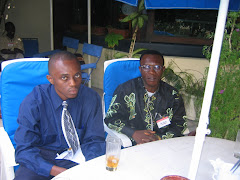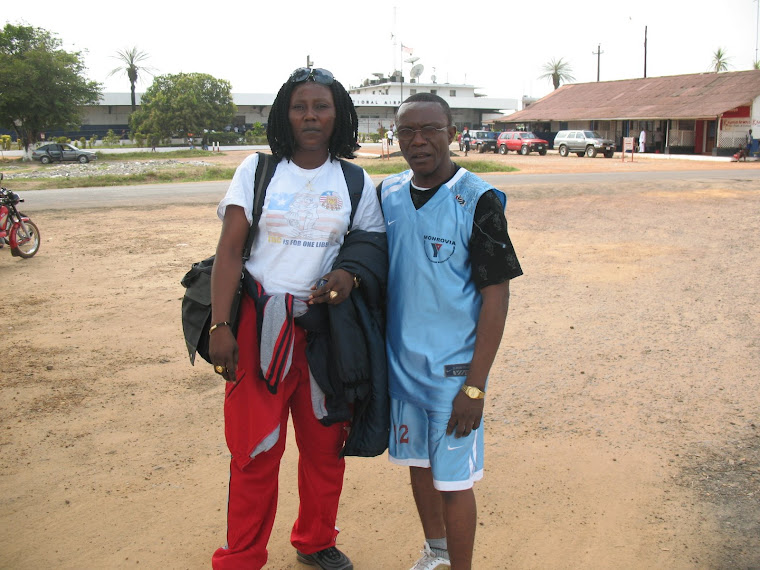 …Finance Ministry Wants PFM Law Passed
…Finance Ministry Wants PFM Law PassedBy: Bill K. Jarkloh Reports
http://www.newvisionliberia.com/
http://www.panwhanpen.com/
billkjarkloh.wordpress.com
“One critical step to assure further progress” in the debt relief campaign of gthe Ellenj Johnson Sirleaf Government,” Finance Minister Augustine Kpehe Ngafuan says, “is the passage and implementation of the comprehensive Public Financial Management (PFM) law, which is now at the Legislature for passage.
The Minister of Finance who therefore calls on members of the National Legislature to put the passage of the PFM law high on its agenda as they return form the Easter Break, told a news conference Thursday that the passage and implementation of PFM law is critical in the total alleviation of Liberia from its staggering debt burden which, according to him, has undermined the credibility of the country in international circles.
Saying that this government has inherited more than US$4 billion debt to financial institutions and donor countries, Mr. Ngafuan said, “In 2006 when the Government of HE Ellen Johnson Sirleaf took over, we inherited an enormous burden, mostly a huge external debt overhand of about US$4.9 billions, equivalent to 700 percent of our Gross Domestic Product, by far the highest ratio of any country in the world.”
The Finance Minister noted that in order to restore economic sanity to Liberia, “the government decided to confront head-on this nightmarish challenge by working with its international partners through the Heavily Indebted Poor Counties (HIPC) Initiative. Accordingly, we as a government committed ourselves to instituting a host of sound reform measures as a way of restoring confidence in our partners and or people, thereby making it easy for us to get back our lost credibility.”
Flanked by his deputy Tanue Marwolo and Deputy Information Gabriel Williams and other officials of Government’s economic management team, Ngafuan indicated, “Today we are in good standing with the international financial institutions, the IMF, the World Bank, and the ADB for the first time in decades.”
He also pointed out that Liberia is also rewarded for our reform efforts with a generous restructuring agreement with the Paris Club, a group of bilateral creditors who have already eliminated 900 million in debt with more to come once we reach Completion Point.
“Continuing on the path of bilateral debt reduction,” he accentuated, “I hereby announced that I today signed on behalf of the Liberian government an agreement with the British government immediately waiving an equivalent of US$45.5 million of our US$50.6 million debt. The remaining US$5.1 million debt is expected to be waived by the British Government when we reach the HPIC Completion Point’ he explained.
Liberia bought back US$1.2m debt
Mr. Ngafuan averred that while the government has been making tremendous strides in dealing with our debt situation with our bilateral and multilateral partners, “we still had to tackle the huge debt burden with our commercial creditors. In this respect, it is an exhilarating privilege that I inform you that we have taken a giant step forward tin our debt reduction effort.”
He then announces that I am pleased to announce that Liberia has bought back 1.2 million dollars of debt from its foreign financial creditors. “On Tuesday April 14, 2009, we concluded the exercise of purchasing back our commercial debt at a discount of nearly 97 percent off the face value, the deepest discount ever negotiated on a developing country’s commercial debt,” he explained.
Moreover, he said creditors holding 97.5 percent of the claims participated, one of the highest rates of participation in a sovereign debt buyback in the last few decades and explained that the buyback means that Liberia will now be able to take off 1.2 billion dollars of debt of the government’s balance sheet which means in a simple term that Liberia’s debt stock has reduced by 1.2 billion dollars.”
“The retiring of 1.2 billion dollars of debt is the single largest action in addressing our debt burden that we have completed to date. We can now safely and proudly proclaim that with the significant reduction, our overall debt burden is now a full 3 BILLION DOLLARS less that it was three years ago,” he bragged, saying “The buyback occurred with a strong support of our international partners, who provided the 38 million needed to complete the operation. The World Bank provided half of the financing for the buyback, and the World Bank’s Debt Reduction Facility provided the mechanism for other partners to contribute and to conclude the operation.”
Already, reports from the World Bank Headquarters http://www.worldbank.org/liberia have authenticated the information from the Ministry of Finance at home. According to the report, Liberia has slashed debt with $1.2 billion buyback at steep discount and added that buyback was completed at no cost to the citizens of Liberia.
According to the dispatch on the World Bank web, Liberia today on April 16, 2009, announced that it had significantly reduced its foreign debt by buying back $1.2 billion in outstanding government debt at a discount of nearly 97 percent of face value, the steepest ever negotiated on developing country commercial debt.
Buying back cost US$38m
The deal, the report said, was concluded with the payment of $38 million to retire 25 outstanding commercial claims. The World Bank contributed half of this money through the International Development Association (IDA) Debt Reduction Facility, and Germany, Norway, the United Kingdom, and the United States contributed the other half.
“The successful resolution of this inherited debt, which had ballooned through interest and penalty charges during a period when my country was wracked by civil war, is an important step on our road to recovery,” the report quoted Liberian President Ellen Johnson Sirleaf, who furthered that this puts us on a firmer footing to attract investment and accelerate economic growth.
“This buy-back significantly eases Liberia’s heavy external debt burden and normalizes the country’s financial relationships with the investment community,” said World Bank Group President Robert B. Zoellick. “The support to the buy-back by the Bank’s Debt Reduction Facility is part of our commitment to help heavily indebted poor countries reduce their debt burden”.
This deal cuts Liberia’s foreign debt to $1.7 billion, representing a reduction of more than $3 billion in the last two years. Most of the remaining debt will be cancelled when Liberia reaches its Completion Point under the Heavily Indebted Poor Country (HIPC) initiative, probably in 2010.
he bought back debt had been in default since the mid-1980s when Liberia was beginning to descend into civil war. During the intervening years, most of the debt was sold and often resold on the secondary market.
The Liberia deal, which had been in negotiation for two years, is the first successful debt buyback in which the vast majority of the debt was held by hedge funds and other distressed debt investors rather than by the original creditors. Creditors holding 97.5 percent of Liberia’s foreign commercial debt participated in the deal, one of the largest rates of participation in a sovereign debt buyback in the last several decades.
In December 2007, the World Bank financed Liberia’s clearance of its overdue debt service payments to the World Bank, resulting in a reduction in its debt of close to $400 million, and a similar operation with the African Development Bank led to a reduction of an additional $250 million. Negotiations with its bilateral creditors have led to cancellations of approximately $800 million.
Liberians are among some of the poorest people in the world, with an average annual per capita income of $150. More than half of the population of 3.5 million is under 25 years old, meaning that most Liberians had not even been born when the original debt was incurred. Liberia has recovered quickly since the end of the war in 2003. Economic growth has accelerated to nine percent a year, school enrolments have grown rapidly, and health facilities have re-opened across the country.



